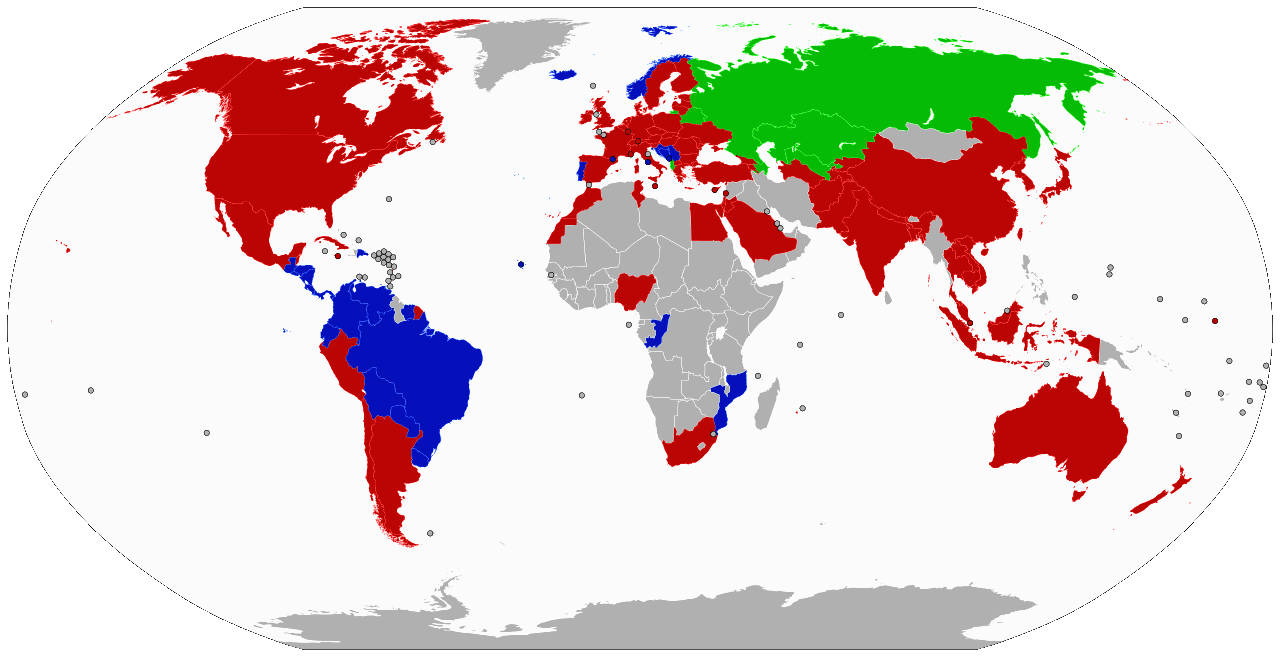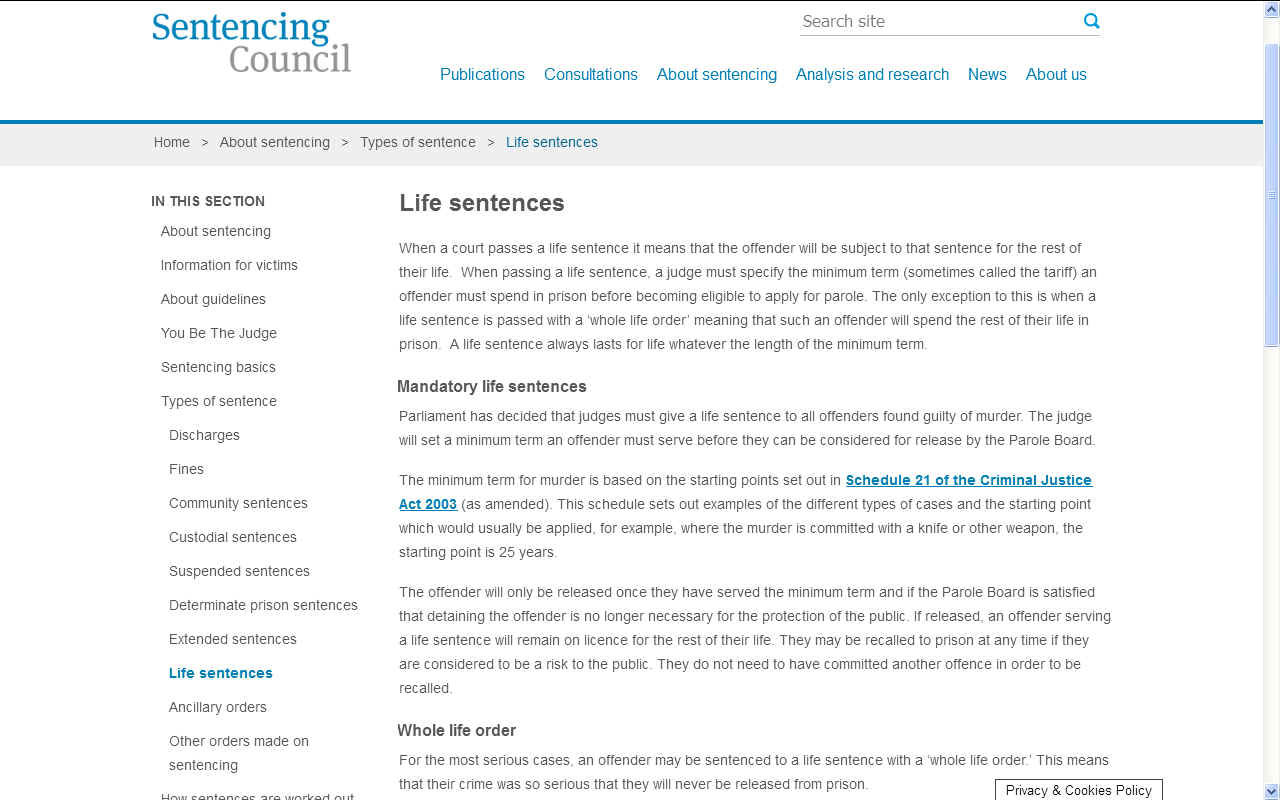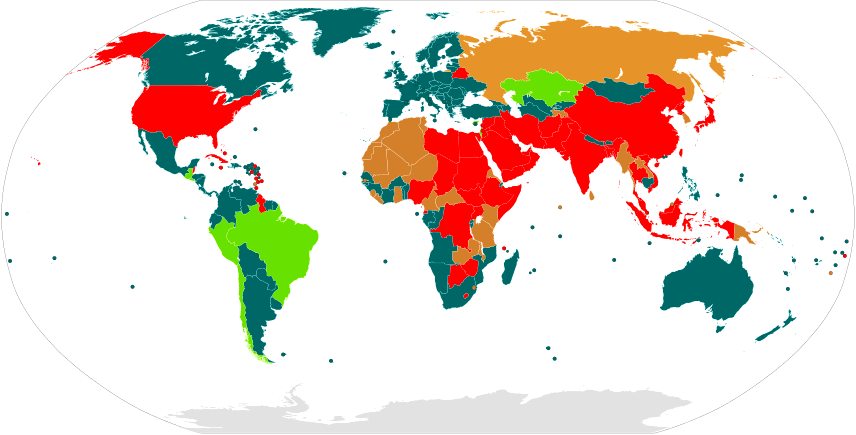|

Capital punishment, also known as the death penalty, is a government-sanctioned practice whereby a person is killed by the state as a punishment for a crime. The sentence that someone be punished in such a manner is referred to as a death sentence, whereas the act of carrying out the sentence is known as an execution. Crimes that are punishable by death are known as capital crimes or capital offences, and they commonly include offences such as murder, treason, espionage, war crimes, crimes against humanity and genocide. Etymologically, the term capital (lit. "of the head", derived via the Latin capitalis from caput, "head") in this context alluded to execution by
beheading with an axe or in France, the guillotine.
Fifty-six countries retain capital punishment, 103 countries have completely abolished it de jure for all crimes, six have abolished it for ordinary crimes (while maintaining it for special circumstances such as
war
crimes), and 30 are abolitionist in practice.
Capital punishment is a matter of active controversy in several countries and states, and positions can vary within a single political ideology or cultural region. In the
European
Union, Article 2 of the Charter of Fundamental Rights of the European Union prohibits the use of capital punishment. The Council of Europe, which has 47 member states, has sought to abolish the use of the death penalty by its members absolutely, through Protocol 13 of the
European Convention on Human
Rights. However, this only affects those member states which have signed and ratified it, and they do not include Armenia,
Russia, and Azerbaijan.
The United Nations General Assembly has adopted, in 2007, 2008, 2010, 2012 and 2014, non-binding resolutions calling for a global moratorium on executions, with a view to eventual
abolition. Although most nations have abolished capital punishment, over 60% of the world's population live in countries where the death penalty is retained, such as
China,
India, the
United
States, Indonesia, Pakistan, Bangladesh among all mostly Islamic countries, as is maintained in
Japan and Sri Lanka.
One
of the problems with executing those convicted of a crime is the
possibility that the state prosecutors
have got it wrong. This happens more often than the public realise,
where retrospective DNA
testing proves innocence or where in the case of rape, the claimant is
proven to be intact (a virgin)
or other conflicting evidence comes to light, showing the claimant to be
a liar.


REFORM
OR ABOLITION In a number of countries,
life imprisonment has been effectively abolished. Many of the countries whose governments have abolished both life imprisonment and indefinite imprisonment have been culturally influenced or colonized by
Spain or Portugal and have written such prohibitions into their current constitutional laws (including Portugal itself but not Spain).
A number of European countries have abolished all forms of indefinite imprisonment, including Serbia, Croatia and Spain, which set the maximum sentence at 40 years (for each conviction, which in practice keeps the possibility of de facto life imprisonment), Bosnia and Herzegovina, which sets the maximum sentence at 45 years, and Portugal, which abolished all forms of life imprisonment with the prison reforms of Sampaio e Melo in 1884 and sets the maximum sentence at 25 years. Pope Francis proposed the abolition of both capital punishment and life imprisonment in a meeting with representatives of the International Association of Penal Law. He also stated that life imprisonment, recently removed from the Vatican penal code, is just a variation of the death penalty. Many countries have abolished capital punishment either in law or in practice. Since
World War II there has been a trend toward abolishing capital punishment. Capital punishment has been completely abolished by 102 countries, a further six have done so for all offences except under special circumstances and 32 more have abolished it in practice because they have not used it for at least 10 years and are believed to have a policy or established practice against carrying out executions.
The death penalty was banned in China between 747 and 759. In Japan, Emperor Saga abolished the death penalty in 818 under the influence of Shinto and it lasted until 1156.
In England, a public statement of opposition was included in The Twelve Conclusions of the Lollards, written in 1395. Sir Thomas More's Utopia, published in 1516, debated the benefits of the death penalty in dialogue form, coming to no firm conclusion. More was himself executed for treason in 1535. More recent opposition to the death penalty stemmed from the book of the Italian Cesare Beccaria Dei Delitti e Delle Pene ("On Crimes and Punishments"), published in 1764. In this book, Beccaria aimed to demonstrate not only the injustice, but even the futility from the point of view of social welfare, of torture and the death penalty. Influenced by the book, Grand Duke Leopold II of Habsburg, the future Emperor of Austria, abolished the death penalty in the then-independent Grand Duchy of Tuscany, the first permanent abolition in modern times. On 30 November 1786, after having de facto blocked executions (the last was in 1769), Leopold promulgated the reform of the penal code that abolished the death penalty and ordered the destruction of all the instruments for capital execution in his land. In 2000, Tuscany's regional authorities instituted an annual holiday on 30 November to commemorate the event. The event is commemorated on this day by 300 cities around the world celebrating Cities for Life Day.
The Roman Republic banned capital punishment in 1849. Venezuela followed suit and abolished the death penalty in
1863 and San Marino did so in 1865. The last execution in San Marino had taken place in 1468. In Portugal, after legislative proposals in 1852 and 1863, the death penalty was abolished in 1867. The last execution of the death penalty in Brazil was 1876, from there all the condemnations were commuted by the Emperor Pedro II until it's abolition for civil offences and military offences in peacetime in 1891. The penalty for crimes committed in peacetime was then reinstated and abolished again twice (1938–53 and 1969–78), but on those occasions it was restricted to acts of terrorism or subversion considered "internal warfare" and all sentence were commuted and were not carried out.
Abolition occurred in Canada in 1976 (except for some military offences, with complete abolition in 1998), in France in 1981, and in Australia in 1973 (although the state of Western Australia retained the penalty until 1984). In 1977, the United Nations General Assembly affirmed in a formal resolution that throughout the world, it is desirable to "progressively restrict the number of offences for which the death penalty might be imposed, with a view to the desirability of abolishing this punishment".
In the United
Kingdom, it was abolished for murder (leaving only treason, piracy with violence, arson in royal dockyards and a number of wartime military offences as capital crimes) for a five-year experiment in 1965 and permanently in 1969, the last execution having taken place in 1964. It was abolished for all peacetime offences in 1998.
In the United States, Michigan was the first state to ban the death penalty, on 18 May
1846. The death penalty was declared unconstitutional between 1972 and 1976 based on the Furman v. Georgia case, but the 1976 Gregg v. Georgia case once again permitted the death penalty under certain circumstances. Further limitations were placed on the death penalty in Atkins v. Virginia (death penalty unconstitutional for people with an intellectual disability) and Roper v. Simmons (death penalty unconstitutional if defendant was under age 18 at the time the crime was committed). In the United States, 18 states and the District of Columbia ban capital punishment.
Abolitionists believe capital punishment is the worst violation of human rights, because the right to life is the most important, and capital punishment violates it without necessity and inflicts to the condemned a psychological torture. Human rights activists oppose the death penalty, calling it "cruel,
inhuman, and degrading punishment".
Amnesty International considers it to be "the ultimate, irreversible denial of Human Rights".
 Most countries, including almost all First World nations, have abolished capital punishment either in law or in practice. Notable exceptions are the United States, China, India, Japan, and most Islamic states. The United States is the only Western country to still use the death penalty.
Since World War II, there has been a trend toward abolishing the death penalty. 58 countries retain the death penalty in active use, 102 countries have abolished capital punishment altogether, six have done so for all offences except under special circumstances, and 32 more have abolished it in practice because they have not used it for at least 10 years and are believed to have a policy or established practice against carrying out executions.
According to Amnesty International, 23 countries are known to have performed executions in 2016. There are countries which do not publish information on the use of capital punishment, most significantly China and North Korea. As per Amnesty International, around 1000 prisoners were executed in 2017.
LEGEND
| |
Retentionist
countries: 56 |
|
|
| |
Abolitionist
in practice countries (have not executed anyone during the last 10
years and are believed to have a policy or established practice of not
carrying out executions): 29 |
|
|
| |
Abolitionist
countries except for crimes committed under exceptional circumstances
(such as crimes committed in wartime): 7 |
|
|
| |
Abolitionist
countries: 106 |
The use of the death penalty is becoming increasingly restrained in some retentionist countries including Taiwan and Singapore. Indonesia carried out no executions between November 2008 and March 2013. Singapore, Japan and the United States are the only developed countries that are classified by Amnesty International as
'retentionist' (South Korea is classified as 'abolitionist in practice'). Nearly all retentionist countries are situated in Asia, Africa and the Caribbean. The only retentionist country in Europe is Belarus. The death penalty was overwhelmingly
practiced in poor and authoritarian states, which often employed the death penalty as a tool of political oppression. During the 1980s, the democratisation of Latin America swelled the ranks of abolitionist countries.
This was soon followed by the fall of Communism in Europe. Many of the countries which restored democracy aspired to enter the EU. The European Union and the Council of Europe both strictly require member states not to practise the death penalty. Public support for the death penalty in the EU varies. The last execution in a member state of the present-day Council of Europe took place in 1997 in Ukraine. In contrast, the rapid industrialisation in Asia has seen an increase in the number of developed countries which are also
retentionist. In these countries, the death penalty retains strong public support, and the matter receives little attention from the government or the media; in China there is a small but significant and growing movement to abolish the death penalty altogether. This trend has been followed by some African and Middle Eastern countries where support for the death penalty remains high.
Some countries have resumed practicing the death penalty after having previously suspended the practice for long periods. The United States suspended executions in 1972 but resumed them in 1976; there was no execution in India between 1995 and 2004; and Sri Lanka declared an end to its moratorium on the death penalty on 20 November 2004, although it has not yet performed any further executions. The Philippines re-introduced the death penalty in 1993 after abolishing it in 1987, but again abolished it in 2006.
The United States and Japan are the only developed countries to have recently carried out executions. The U.S. federal government, the U.S. military, and 31 states have a valid death penalty statute, and over 1,400 executions have been carried in the United States since it reinstated the death penalty in 1976, including 28 in 2015 alone. Japan has 111 inmates with finalized death sentences as of July 26, 2018; after executing Shoko Asahara and six other senior members of Aum
Shinrikyo, a cult group which carried out multiple atrocities involving thousands of victims such as the Tokyo subway sarin attack, which took place on March 20, 1995, on July 6 the executions of the remaining six senior members took place on July 26.
The most recent country to abolish the death penalty was Burkina Faso in June 2018. LINKS
& REFERENCE https://en.wikipedia.org/wiki/Capital_punishment https://opinionfront.com/death-penalty-vs-life-in-prison https://www.sentencingcouncil.org.uk/about-sentencing/types-of-sentence/life-sentences/ https://www.gov.uk/types-of-prison-sentence/life-sentences https://en.wikipedia.org/wiki/Life_imprisonment https://en.wikipedia.org/wiki/Malfeasance_in_office





Vicarage Lane, Hailsham,
East Sussex, BN27 2AX T: 01323 443322
|




